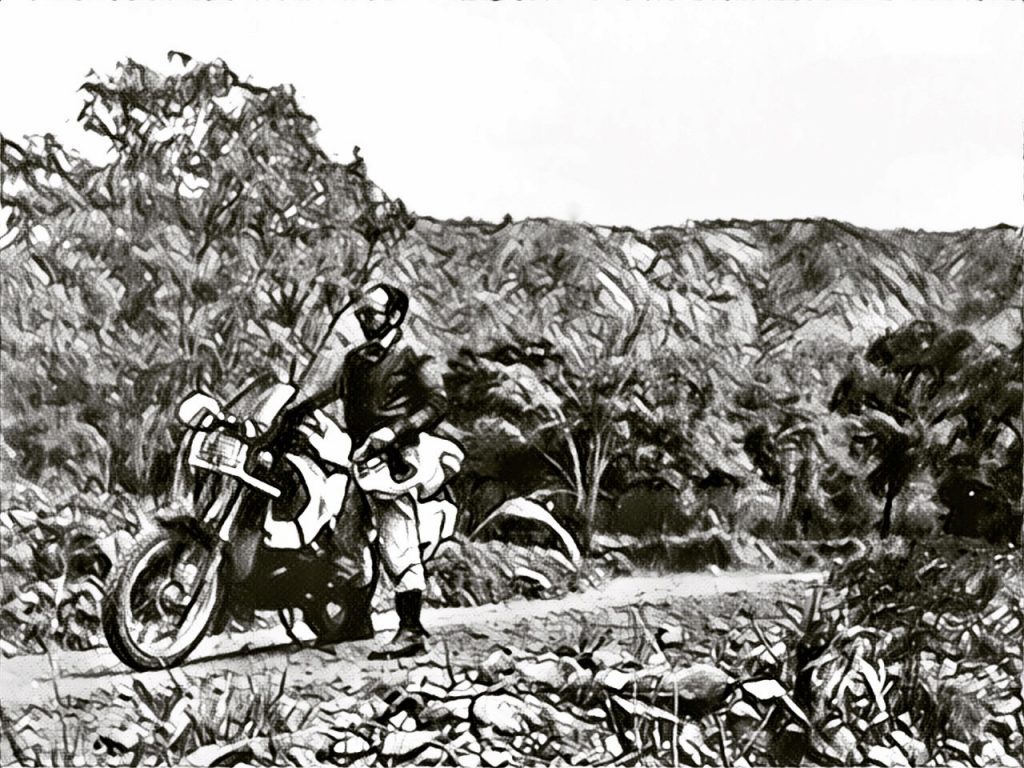‘Why not?’ A question with a flip side.

According to my diary, this was also my 10th month anniversary of starting to ride a motorcycle.
…
‘Why not?’ The question that stops so many people from stretching out and achieving something completely new, can be taken two ways. Punctuation makes all the difference. Let me explain.
In the run up to setting off to ride the length of Africa, with just 9 weeks of experience on a motorcycle, there were plenty of people who thought that I was absolutely barking mad. You can imagine the scene in the pub when I told my mates, none of whom rode motorcycles, that I was going to ride through Africa. ‘Cracked up’ doesn’t even begin to describe the laughter and the incredulous comments I was getting! Until that time they thought I’d just taken on a rather weird hobby.
I wasn’t surprised at their reactions; I’d just passed my motorcycle test. I’d managed to do that in 6 weeks and was, I admit, feeling rather pleased with myself. Who’d have thought that a person like me could learn to do something that requires a significant level of skill, in that short space of time? Of course I knew that I had plenty more to learn, but that just added to the feeling.
I was under the influence of a, too much beer and sitting on my own, combination when I’d had the original idea to ride the length of Africa. That combo had allowed my mind to stretch, to dream and to get rid of a question mark. I realised that I’d spent years subconsciously breaking my own rules, by looking for the reasons why I shouldn’t do something different. I, with those subconscious thoughts, had been building walls that I couldn’t see over.
After all, I was a successful store manager and climbing the ladder. I was doing what I was supposed to be doing.
I understood the two sides of the ‘Why not?’ question very well though. I’d been using it at work within my own business plans and also with staff training. But I’d not applied it to me, as in Sam the person who has a life outside of work.
I’d been teaching staff to realise that looking for reasons why a thing shouldn’t be done was actually quite a healthy thing. It was part of common sense; a sense that is there to protect us from doing things like touching hot surfaces. To balance that and open the possibilities, I’d also been talking about the downside of looking for the negatives. Doing so can take over and can stifle innovation.
A lecturer of mine once said something that has stayed with me through life. I’m sure that many of you will have heard it too. ‘Rules are for the guidance of the wise, and the obedience of fools.’ The youthful rebel in me wanted to bend as many rules as I could find. Especially if doing so was going to make life a more fun and interesting place to be.
With more thought, I realised that it wasn’t only a freedom that the phrase really gave me, but a challenge to really think things through.
Instead of hunting for the reasons why something shouldn’t be done, hunt to see if there really were any founded reasons why something couldn’t be done. Look to see if the immediate negatives were just a smokescreen. Lift stones to see what’s underneath. There are plenty of other clichés…
A letter had arrived in the post one day and it was from the parent of one of my Saturday staff. Her daughter was the first in their family to go to university. She had worked her way there and self-funded her way through it.
Her favourite phrase had been, ‘Why not!’ She’d got rid of the question mark and had set out to achieve.
If in life we can get just one person to learn to use the question mark, and then the exclamation mark, we have done well.
